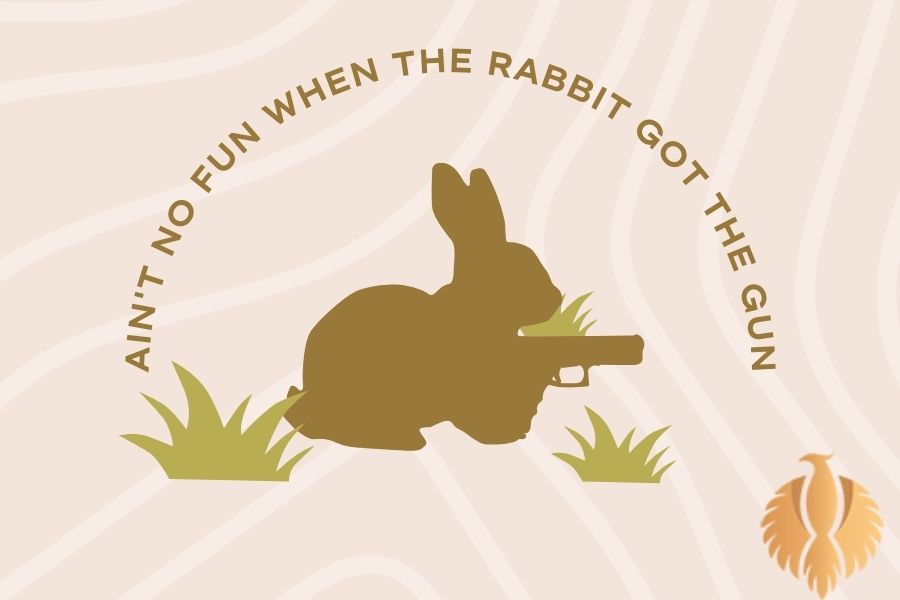In today’s article, we’re going to explore the meaning and significance of the phrase, “Ain’t No Fun When the Rabbit Got the Gun.” This saying carries a metaphorical message that can be interpreted in various ways, shedding light on intriguing aspects of human behavior, power dynamics, and social justice.

Understanding this phrase not only piques your curiosity but also provides valuable insights into how power and empathy play pivotal roles in our society. By delving into its origins and various interpretations, you’ll gain a deeper appreciation for its relevance and the important lessons it conveys.
You might also enjoy: Top 100 Commonly Used Verbs That Start With D [2024]
The Meaning Behind the Phrase
The phrase “Ain’t No Fun When the Rabbit Got the Gun” is a powerful metaphor that reverses the traditional roles of predator and prey. Typically, a rabbit is seen as a vulnerable, defenseless creature, while the hunter or predator holds the power. However, when the rabbit has the gun, the power dynamics shift dramatically. This reversal of roles highlights the discomfort and fear experienced by those who usually hold power when they find themselves at a disadvantage.
One primary interpretation of this phrase revolves around justice and retribution. It implies that those who have been oppressed or mistreated may eventually gain power and seek retribution against their oppressors. This dynamic can be seen in various historical and social contexts, where marginalized groups rise against those who have dominated them. The phrase serves as a stark reminder that power dynamics are not static and can change, often leading to a reversal of fortunes.
Empathy and Understanding
Another significant interpretation of the phrase focuses on empathy and understanding. It encourages individuals to consider the perspectives of those who are typically powerless or marginalized. By imagining what it would be like if roles were reversed, people in positions of power can develop a greater sense of empathy and compassion for others. This can lead to more equitable and just treatment of all individuals, regardless of their social or economic status.
You might also enjoy:Looking Forward To Seeing You: Grammar + Examples[2025]
Personal Relationships and Conflicts
The phrase can also be applied to personal relationships and conflicts. In situations where one person consistently holds power or control over another, the dynamics can shift unexpectedly. When the person who has been dominated gains power, the dominant individual may experience the same discomfort and vulnerability they once imposed on others. This realization can lead to a greater understanding of the impact of their actions and foster more balanced and respectful relationships.
Cultural Significance
In addition to its metaphorical meanings, “Ain’t No Fun When The Rabbit Got The Gun” holds cultural significance. It has been used in various forms of media, including music, literature, and film, to convey themes of justice, revenge, and shifting power dynamics. Its vivid imagery and memorable wording make it a powerful tool for storytelling, effectively conveying complex ideas in a relatable way.
Critical Thinking and Awareness
Understanding the phrase is beneficial as it encourages critical thinking about power dynamics and the consequences of one’s actions. It serves as a reminder that those who hold power should use it responsibly and consider the impact of their actions on others. Exploring the origins and interpretations of this phrase provides valuable insights into human behavior and social dynamics
You might also enjoy:Emersion Vs Immersion: Meaning, Differences, and Examples
What’s the meaning of Ain’t No Fun When The Rabbit Got The Gun? What’s the main answer?
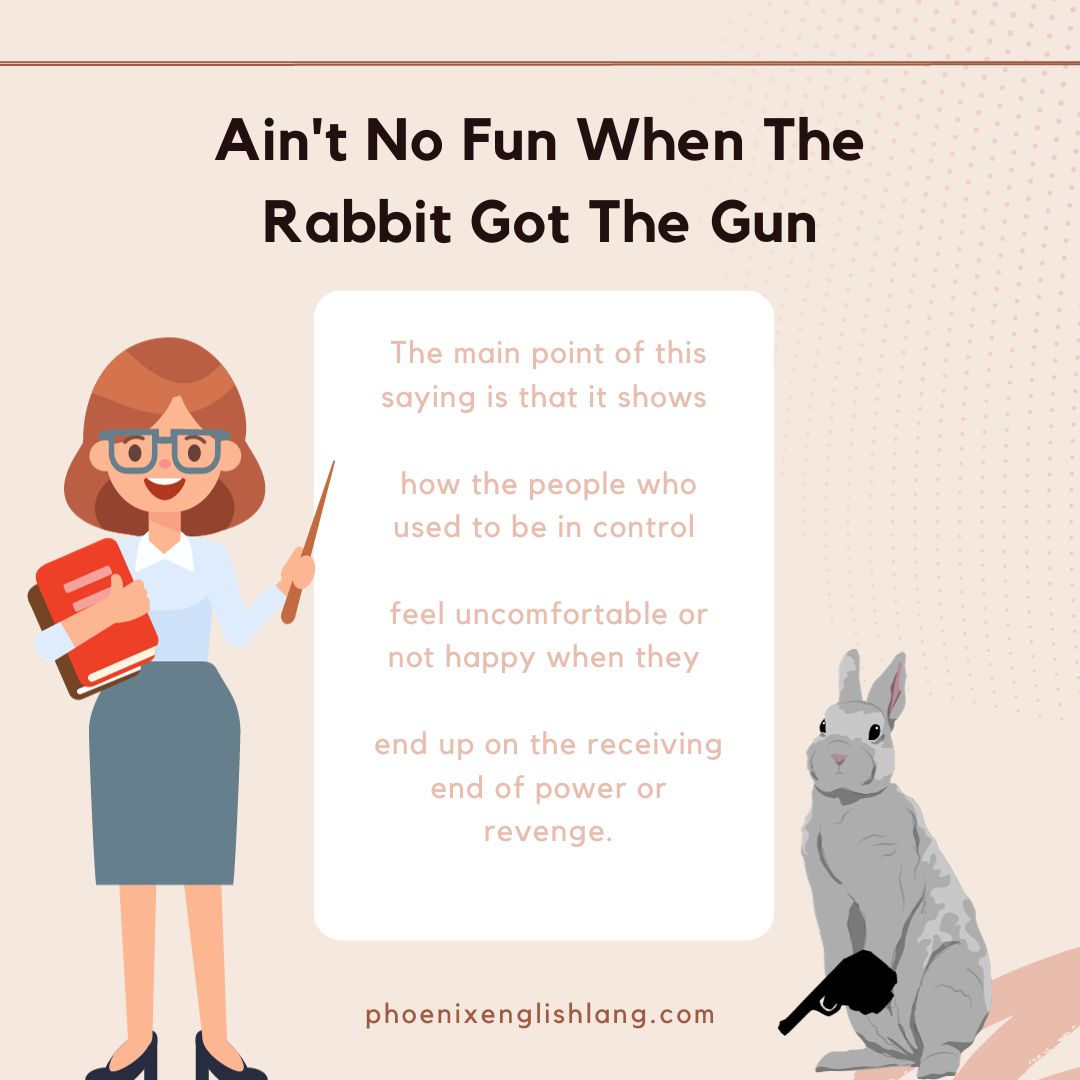
The saying “It ain’t no fun when the rabbit got the gun” is like a way of talking that came from African American Vernacular English (AAVE).
It’s like a saying that means when someone who is usually seen as weak or not powerful suddenly becomes in charge, things get less fun or good for the others who used to be in charge.
It’s like saying the power balance has changed and there might be some consequences.
The main point of this saying is that it shows how the people who used to be in control feel uncomfortable or not happy when they end up on the receiving end of power or revenge.
It’s like a little reminder that things can totally switch up, you know? Like, the people who used to be in charge might have to deal with some consequences or problems when the roles are reversed.
You Might Also Enjoy: Top 60 Most Common Simple Sentences In English
1. The Rabbit and the Gun of ain’t no fun when the rabbit got the gun:
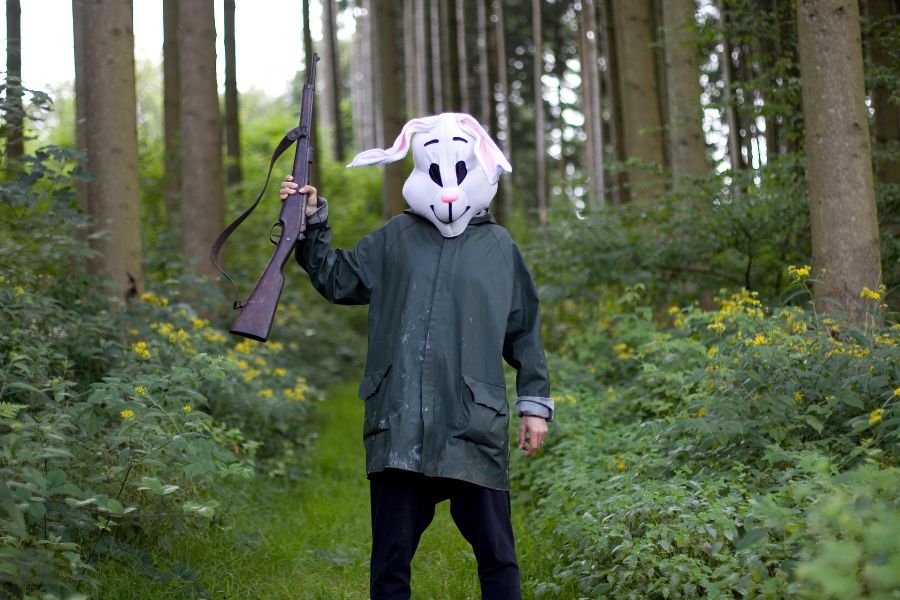
“The Rabbit and the Gun” is a saying that’s all about when things go topsy-turvy and the tables turn.
It’s like when someone who’s usually seen as weak or helpless takes charge or gets some serious strength, and everything gets all flipped around.
When the rabbit’s got the gun, it means things can get real messy and tough for the underdog or the one who’s been dealt a bad hand.
You can use this saying in all sorts of situations, whether it’s in your personal life or at work.
Like, imagine if at your job, there’s this employee who’s always getting treated like garbage or ignored, and then all of a sudden they start calling the shots and throwing their weight around.
It’s gonna make the people who used to be in charge feel pretty uneasy, you know? In a social or political context, it’s like when a group or person who’s been pushed aside finally stands up for themselves and demands justice.
It really throws off the people who’ve always had the upper hand. “The Rabbit and the Gun” reminds us that power dynamics can totally change out of nowhere.
It shows us that it’s important to put ourselves in other people’s shoes, be fair, and think about what might happen if we treat others badly or underestimate them.
It tells us that we should think about things from the perspective of people who might have been pushed aside or had a hard time, because they can also make a difference and shake things up.
To sum it up, “The Rabbit and the Gun” is like when the balance of power gets messed up.
It reminds us that we gotta treat others with respect and fairness, no matter how we think they’re positioned or what their status is.
It’s a warning to be careful ’cause things could go bad when people who’ve been underestimated or oppressed suddenly have the power to shake things up.
2. Reversal of Power of ain’t no fun when the rabbit got the gun :
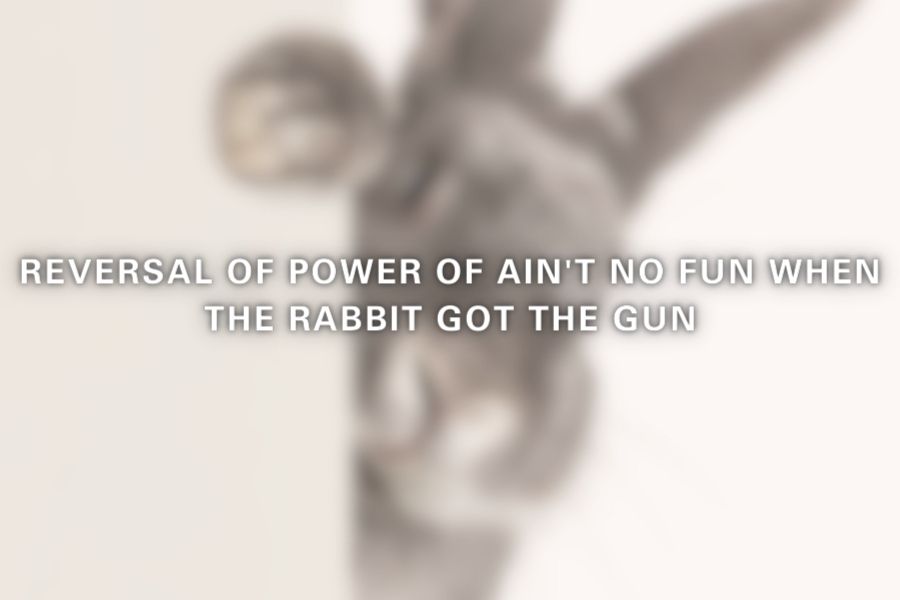
The saying “ain’t no fun when the rabbit got the gun” means that things get real boring when the tables are turned.
It’s like when someone who ain’t usually in charge suddenly takes control and makes it less fun for the ones who used to be in power.
This saying is used to show how those who have been bossing others around or taking advantage of them feel uncomfortable when the roles are reversed.
The idea of a rabbit having a gun adds a surprise element and makes things unpredictable.
Normally rabbits are harmless, but guns are all about power and control. So, the saying means that there’s this sudden and unexpected change in power dynamics, where the person who used to be disadvantaged or oppressed now has the power to stand up for themselves or get back at others.
This saying can be used in different situations, like social, political, or personal relationships, where there’s an imbalance of power.
It’s a reminder that those who abuse their power or take advantage of others might end up facing the consequences when the disadvantaged person gains control.
In short, the saying “ain’t no fun when the rabbit got the gun” shows how the power dynamics can flip, and it highlights the discomfort or consequences that the people in control might experience.
It’s a reminder to be careful about exploiting or mistreating others when the balance of power changes.
You might also enjoy:How Are You Fairing or Faring? Differences + Examples
3. Consequences of Empowerment of ain’t no fun when the rabbit got the gun:
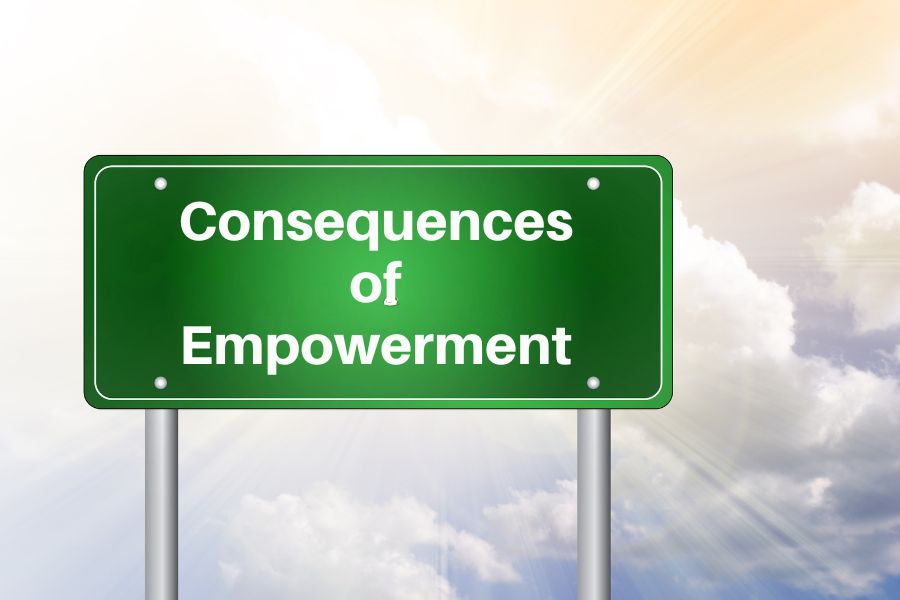
The saying “it’s no fun when the rabbit has the gun” is a casual way to describe what happens when someone who used to be disadvantaged or oppressed suddenly gets power.
It means that when the situation changes and the once-vulnerable person gains control, things can get tough or unpleasant for those who used to be in control.
When people who have been historically mistreated or oppressed get empowered, it can have big effects, both good and bad.
On the positive side, empowerment can make society more fair, giving those who were disadvantaged a chance to succeed and make a difference.
It can promote fairness, equal rights, and inclusivity, making those who were marginalized feel strong, valuable, and respected. But empowering people who have been oppressed can also bring challenges and negative effects.
When people who used to be oppressed get power, they might wanna get back at their oppressors or show them who’s boss.
And that can start a whole cycle of payback, making people hate each other and causing divisions. Also, when folks who were pushed to the sidelines suddenly get power, things in society can change.
The ones who used to be in charge might feel threatened or not want things to change, so they resist and start conflicts, making everything tense and unstable.
Plus, when people who have been oppressed get empowered, there might be some unintended consequences in their own communities.
The new power can cause divisions and hierarchies within groups that are not treated well, as different people compete for control or influence.
This can lead to fights and battles for power, which undermines the unity and collective strength that empowerment aims to create.
It’s important to understand that the consequences of empowerment are complicated and have many different aspects.
While it’s crucial to address past unfairness and give power to people who have been treated unfairly, it’s just as important to encourage conversations, understanding, and making peace between different groups.
By encouraging empathy, respect, and working together, we can deal with the challenges that might come from giving power to people who were previously disadvantaged, and make sure that society becomes more inclusive and peaceful for everyone.
4. Shift in Perspective of ain’t no fun when the rabbit got the gun:
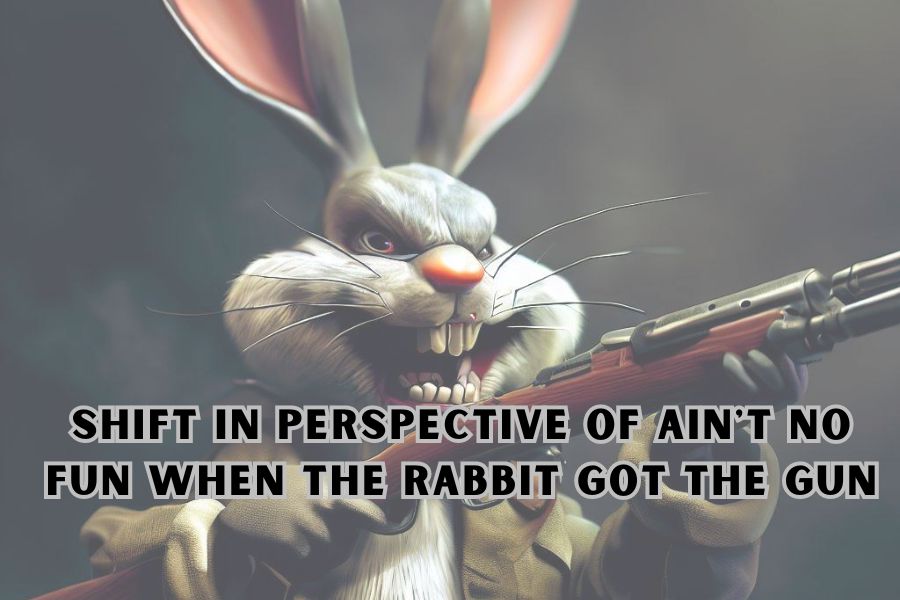
The saying “ain’t no fun when the rabbit got the gun” is like when the tables turn or roles get reversed.
It means that when someone who’s usually in a weaker position takes charge, things become less enjoyable or advantageous for those who were in power before.
This change in perspective can be seen in different situations, like relationships, social dynamics, or even in society as a whole.
In relationships, you can use this phrase when one person who’s been submissive or taken advantage of suddenly gains control.
For example, in a romantic relationship, if one partner has always been mistreated or ignored but then decides to stand up for themselves and demand respect, the whole dynamic between them can totally change.
The partner who’s used to being in control might find it hard or awkward to get used to this new power thing, making the whole experience less fun for them.
On a bigger scale, you can also see this change in how people interact and who’s in charge.
In places where certain groups have always had the power and the good stuff, if marginalized communities try to stand up for their rights and demand fairness, the powerful folks might resist and feel uneasy.
This change messes with the way things usually are and makes the ones who used to be in charge face their own biases and privileges.
So, they might see this change as a loss of control or a threat to their own interests, which makes the experience less enjoyable for them.
Also, the phrase can be used for bigger societal structures like political systems or economic frameworks.
When people or groups who have been pushed aside or treated badly gain political power or economic influence, it can mess up the way things are and challenge the interests of those who have always been in charge.
This change in how we see things can cause some people to resist, fight, and feel uneasy if they used to be in charge.
Basically, the phrase “it’s not fun when the rabbit has the gun” sums up the idea of a change in perspective and power.
Whether it’s in personal relationships, social dynamics, or bigger societal structures, when those who used to be less powerful gain control or authority, it can make those who were used to being in charge feel uncomfortable and make them push back.
This change challenges how things normally are and makes individuals face their own biases and advantages, which ultimately shapes how we see and move through the world.
You might also enjoy:What Kind of Vs What Kinds of – Differences + Examples [2025]
5. Lessons in Empathy and Equality of ain’t no fun when the rabbit got the gun:

Lessons in empathy and equality are super important for creating a chill and inclusive society.
The saying “it’s no fun when the rabbit has the gun” basically means that when power is all out of whack, it can lead to some seriously bad consequences.
But if we all show empathy and treat each other equally, we can keep things balanced and fair.
This saying shows how it’s crucial to understand and respect other people’s perspectives, especially those who have been left out or treated unfairly.
Empathy, which is when you can understand and share someone else’s feelings, is key to making sure everyone is treated equally.
When we can empathize with each other, we can better understand the struggles and experiences that different groups go through.
And that leads to policies and actions that include and help everyone. For example, when it comes to racial equality, empathy lets people see the racism that marginalized communities have to deal with and helps them work towards breaking down these unfair systems.
Plus, empathy can bring different social groups closer together and make them feel like they’re all on the same team.
When you put yourself in someone else’s shoes, you really start to understand their struggles and dreams.
And that understanding can make you feel more compassionate and supportive towards each other.
Like, when you empathize with the challenges that the LGBTQ+ community faces, you’re more likely to fight for equal rights and make the world a more welcoming place.
On the other hand, equality means treating everyone fairly and without any unfairness.
It’s like the base for a fair society where everyone gets the same chances and access to stuff. You know that saying “it ain’t no fun when the rabbit got the gun”?
Well, it’s just a reminder that when power is all messed up, it can lead to unfair treatment and bad stuff happening.
Equality makes sure that power is shared out evenly, so it stops people from abusing their power and helps make society fairer.
A good example of why equality is so important is gender equality. In the past, women have had to put up with being treated unfairly and discriminated against in lots of different areas of life, like education, jobs, and being in charge.
But, because people have realized how important equality is, things have gotten better and the gap between men and women has started to close.
There are now rules to make sure men and women get paid the same, quotas to make sure women are in politics, and projects to challenge the way people think about gender stereotypes – all of which have helped make society more equal.
In conclusion, the saying “ain’t no fun when the rabbit got the gun” reminds us how important it is to be understanding and fair in our interactions and society as a whole.
When we show empathy, we can understand and support each other, and when we have equality, everyone is treated fairly and justly.
By learning from these lessons, we can make a world where everyone’s voices matter and are respected.
What does no fun when the rabbit got the gun mean?
The expression “no fun when the rabbit got the gun” typically means that a situation is less enjoyable or amusing when the tables are turned, and someone who was previously at a disadvantage or being pursued now has the upper hand or control. It implies a shift in power dynamics or perspective.
You might also enjoy:Interested In or On: The Differences + Examples [2025]
What does it mean for the rabbit to have the gun?
When it’s said that “the rabbit has the gun,” it suggests a reversal of roles or a shift in power dynamics.
In a traditional scenario, the rabbit might be seen as a prey animal, but when it has the gun, it implies that the one who was once pursued or disadvantaged now has control or influence. It’s often used to convey a change in circumstances where the underdog or previously vulnerable party now holds an advantage.
What is the moral story in rabbit?
One well-known moral story featuring a rabbit is “The Tortoise and the Hare.” The story teaches the moral lesson that slow and steady wins the race.
In the fable, the hare is overconfident due to its speed, while the tortoise, though slower, persists steadily in the race. In the end, the tortoise wins because of its consistent effort, highlighting the importance of perseverance and humility over arrogance.
Why do they say the rabbit died?
The expression “the rabbit died” is an outdated euphemism that was once used to indirectly convey a positive pregnancy test result.
Before modern pregnancy tests, rabbits were sometimes used in a test called the “rabbit test.” If a woman’s urine injected into a female rabbit caused changes in the rabbit’s ovaries, it was interpreted as a sign of pregnancy.
The phrase “the rabbit died” was a way of announcing a positive result without explicitly stating it. However, this method of testing is no longer in use, and more accurate and humane pregnancy tests have been developed.
What does rabbit mean as an insult?
In some contexts, the term “rabbit” can be used as a slang or informal insult. However, the meaning may vary based on the specific region or culture.
Generally, when used as an insult, “rabbit” might imply someone who is considered weak, timid, or easily frightened.
It’s essential to note that the impact of such language can depend on the cultural and local context, and it’s always advisable to use respectful and considerate language in communication.
You might also enjoy:Where Does “How is your Day Going?” Originate From?
What does the rabbit mean?
The meaning of the term “rabbit” can vary depending on the context. It could refer to the small mammal known for its long ears and hopping gait.
In other contexts, it might be used as slang, metaphor, or in idiomatic expressions where its meaning is derived from the specific phrase or conversation. If you have a particular context in mind, providing more details would help in giving a more accurate explanation.
What is the rabbit effect story?
The “Rabbit Effect” refers to a concept related to a scientific study rather than a specific story. The term comes from a study conducted by Dr. Robert W. Wilson in the 1970s, where he observed a curious phenomenon while researching heart disease in rabbits.
The unexpected factor influencing the rabbits’ health turned out to be the kindness and attention they received from the researchers, rather than the intended experimental interventions.

The study suggests a connection between social support, care, and positive health outcomes. The idea is that the emotional and social environment, akin to the “Rabbit Effect,” can have a profound impact on overall well-being.
The term is sometimes used more broadly to discuss the broader influence of social factors on health outcomes in humans.
You Might Also Enjoy:Reinforce Vs Reenforce: 10 Differences + Examples [2025]
What is a white rabbit slang?
The term “white rabbit” can have various meanings depending on the context. In slang, it might be used to refer to a person who is perceived as elusive, hard to catch, or difficult to pin down.
It could also have different meanings in specific subcultures or communities, so its interpretation may vary based on the context in which it is used.
What does the rabbit mean in psychology?
In psychology, the term “rabbit” is not commonly associated with a specific concept or symbolism. However, rabbits or other animals may be used in certain psychological tests, experiments, or therapeutic settings to study behavior, cognition, or emotional responses.
Additionally, the idea of the “Rabbit Effect” in psychology could refer to the unexpected positive impact of social and emotional factors on health, as observed in a study involving rabbits. If you have a specific psychological context or concept in mind, providing more details would help in giving a more accurate explanation.
Why was the rabbit crying?
The phrase “Why was the rabbit crying?” seems like the beginning of a story or a joke, but without more context, it’s unclear why the rabbit might be crying.
In general, animals don’t cry emotionally in the same way humans do. If you have a specific story, joke, or context in mind, please provide more details, and I’ll do my best to assist!
What does ain’t no fun when the rabbit got the gun mean?
The expression “ain’t no fun when the rabbit got the gun” is a colloquial way of saying that a situation becomes less enjoyable or amusing when the one who was previously at a disadvantage or being pursued now has control or power.
It highlights a shift in dynamics where the one who was once vulnerable or on the receiving end now has the upper hand, and the situation may not be as enjoyable for others involved.
You might also enjoy:Which of the Following: Definition + Complete Usage + Grammar
What does gun bunny mean?
“Gun bunny” is a slang term that can have different meanings depending on the context. In some cases, it may refer to someone who has a strong interest in firearms, shooting sports, or military-related activities.
However, it’s essential to note that the meaning can vary, and in certain contexts, “gun bunny” might be used differently. Always consider the specific context in which the term is used to better understand its intended meaning.
Conclusion
“Ain’t No Fun When The Rabbit Got The Gun” is like a saying that shows how things change when someone else takes control.
It makes us remember that it’s important to understand and care about others’ feelings and opinions.
By thinking about what this phrase means, we can learn more about how power works and work towards a fair and equal society.

Hi, welcome to my blog! My name is Omid and I am thrilled to have you here! I am an English language teacher with 12 years of experience and hold multiple international certifications (TESOL, IELTS, TOEFL, PTE, CELTA). Additionally, I hold a PhD in Applied Linguistics with a specialization in Teaching English as a Second Language (TESL), which fuels my passion for teaching English and assisting others in mastering the language. To me, nothing is more rewarding than helping individuals enhance their English language abilities through various methods. So, let’s embark on this journey of learning English together.

